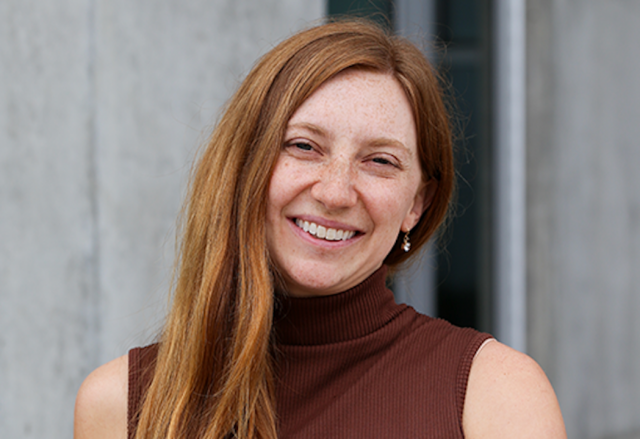BIOENGINEERING’S MARLEY DEWEY NAMED 2025 HELLMAN FACULTY FELLOW
Award supports work to outsmart bacteria and pioneer new therapies for implant-associated
infections.

UC Santa Barbara bioengineering assistant professor Marley Dewey has received a prestigious 2025 Hellman Family Faculty Fellowship, an award that provides $50,000 in critical research funding. The award is designed to help promising faculty, who “show capacity for great
distinction in their chosen fields,” develop a strong research record in preparation for tenure review.
“I am incredibly grateful for this award because it supports my efforts to examine new ways to treat infections that impact millions of people worldwide and recognizes my lab’s work in this space,” said Dewey, adding that the award does much more than fund graduate students in her
group. “Fellowships are also crucial for gaining recognition from other researchers and the public that this work is important. All of this helps with tenure and accelerates our work toward publications and real-world impact and translation to the public.”
The fellowship will allow Dewey and her group to harness bacteria’s own communications system to fight one of medicine’s most stubborn problems: infections caused by implanted biomaterials. Implant-associated infections account for up to 45 percent of all hospital-acquired
infections, often leading to costly complications and prolonged hospital stays. Current treatments rely on antibiotics, but bacteria commonly form protective biofilms — slimy layers that block drugs from reaching them.
“Biofilms are like a shield,” explained Dewey. “They make it extremely difficult for antibiotics to do their job.”
By loading antibiotics into tiny biological packages called extracellular vesicles (EVs), which are naturally produced by bacteria and other cells, the team aims to outsmart bacterial defenses and prevent dangerous biofilm formation.
“EVs are nano-sized cargo-delivery vehicles produced by cells, which naturally act to transport communication signals between bacteria and other cells,” explained Dewey. “We are investigating what happens if we use EVs to deliver antibiotics directly to bacteria.”
Her team will develop methods to load antibiotics into EVs collected from biofilms produced by Staphylococcus aureus, a common infection-causing bacterium. By using the bacteria’s own delivery vehicles against them, the team hypothesizes that antibiotic-loaded EVs will penetrate
biofilms more effectively than drugs administered on their own. If successful, the approach could lead to therapies that both prevent and disrupt biofilms on surgical implants, reducing infection rates, lowering healthcare costs, and saving lives.
“Our long-term goal is to create more effective ways of delivering antibiotics, so we can stay one step ahead of infections,” she added.
Earlier this year, Dewey received a Maximizing Investigators Research Award (MIRA) from the National Institutes of Health. The five-year, $2.1 million award allows Dewey’s research group to further investigate EVs and their role in tissue and wound repair.
The Hellman Fellowship program began in 1995 at UC Berkeley and UC San Diego and has since expanded to all ten UC institutions. Since its founding, nearly 2,000 promising early-career faculty have received Hellman Fellowships.